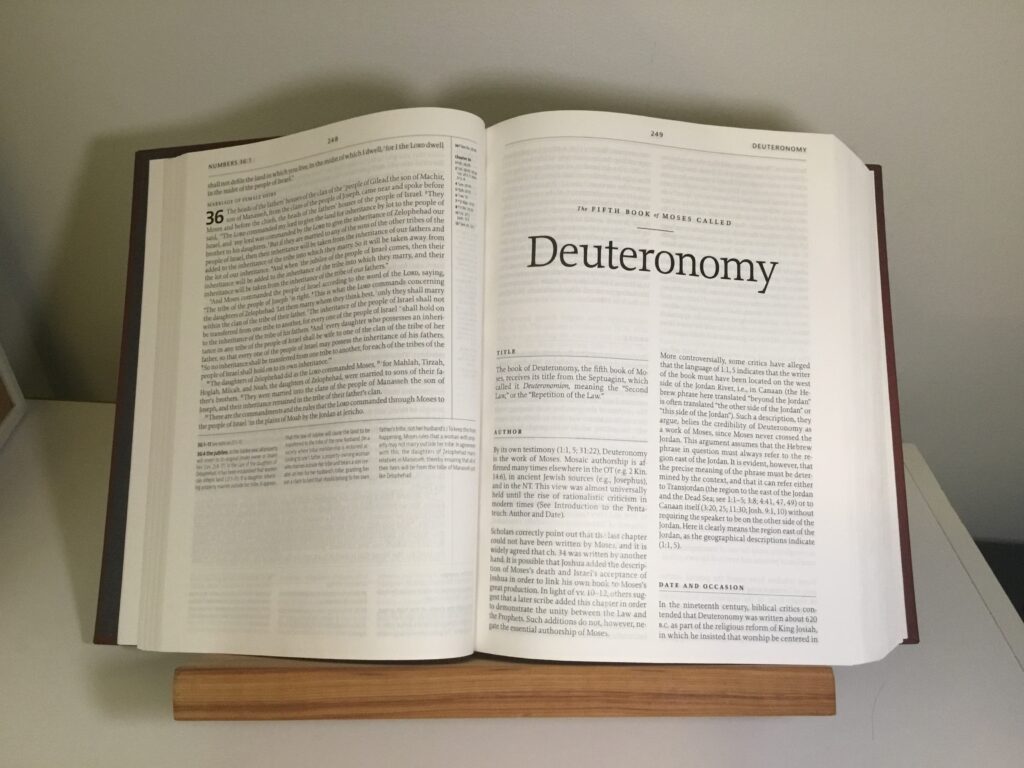
This page of the Bible will always be very special to me, because this was the page that I finally started and also finished the Bible from cover to cover. As this will be the first post that I will be making, I deemed that it would be appropriate to share something that was also a first for me, about two months ago on Monday the 8th of June this year.
Reflecting on it now, I feel like I know a lot less than I did before. Reading through the Bible once is much like the cliched adage of seeing the tip of the iceberg, where after a cursory exploration you realise that there are still caverns of insight that lay unexplored. A lifetime of study won’t even begin to exhaust the understanding that could be gained. I wrote in my journal on that day: “I didn’t think I would get this far. To have come one circle feels so strange, but at the same time it is a testament to God’s saving work. All I can think is to wonder at the majesty of God and say Soli Deo Gloria. To the Glory of God alone.”
If you are questioning as to why I chose to start on Deuteronomy – it was because I couldn’t be bothered to go through Leviticus and Numbers at the time. As I ventured through each book, an ever dawning awe impressed on me that the whole canon of Scripture is beautifully stitched as a perfect tapestry by the hand of God. An understanding of one book complements another, where every book is like a lens that God Himself shines through. All these books all focus on a single person – the person and work of Jesus Christ.
To be frank, I didn’t realise how hard it would be to get through the Bible. When I started around March/April 2019, I said to myself – “ okay, two chapters a day”. However, it was actually quite difficult to keep up with it. Then later, being dejected, I reset my goal to “just read 1 line, or even one word of scripture, and everything else you read that day is a bonus”. With this goal being so pathetically low, it was initially an atomic habit that I have been able to build up, and it has been a habit that I am most thankful for in these past few months. Having got to the end, I think it is without question that every Christian should read the entire Bible at least once in their lifetime. I realised through reading that true Christianity is not an “emotional high” religion. Past all that emotion, say after a hyped up church service, one reverts back to his own sinful, God absent life. What truly keeps the Christian going is the fear of the LORD and the daily feasting on His Word.
The fear of the LORD is the beginning of knowledge.
Proverbs 1:7a (ESV)
Dr. R.C. Sproul, in one of his lectures in the series Dust to Glory on the overview of the Bible, said something that has stuck in my mind since. The Bible can be thought of metaphorically as a forest, where each tree can be represented by a book. There is value in observing the microscopic details, as well as the macroscopic, overarching ideas of the Bible. If we do a detailed study of one book and look at it exegetically, it is much like using a magnifying glass to observe one leaf of scripture. We can appreciate the intricate details of this leaf, as well as how beautifully it is designed! Sproul thereafter said that it is also of value to be able to continually breathe in the forest that is the entire Word of God. We should walk and enjoy the forest that is the Bible – to appreciate and marvel at the entirety of scripture. To not lose the forest from the trees, so to speak. Martin Luther, the legendary reformer would write or preach on a particular passage each week. However, he still made the effort to read through the Bible once a year. There is something special about reading the whole of scripture from cover to cover, where when you do so, you begin to grasp its entire structure, context, and deliberate ordering, where that sheds light or imparts an appreciation of all the books within it. Much like how a brick, though it may not have any intended functionality on its own, can be used with other bricks to have an emerging property like a house, which can be dwelt in. If we have a broad understanding of the forest, we understand how the trees interact and communicate with each other in this beautiful ecosystem, that is the Word of God.

The Difficulty of The Old Testament
Going on past Joshua, I was in unknown territory – faced with so much historical knowledge of First and Second Kings and Chronicles, I found it quite difficult and repetitive. Now looking back in hindsight, I realise that God instills discipline in us when we read His Word – because it IS difficult and repetitive. However, it is a joy to finally cover the story of David in full. For me, David has been the epitome of the brokenness and beauty of humanity all in one man.
Despite some of these books being difficult and repetitive, these books are still the Word of God, and they must be given their due respect. These historical documents are indispensible to understanding the history of Israel. A continuing trend I observed in the Old Testament was that God’s chosen Nation, Israel, failed and sinned generation after generation. And we, in the present, are inherent failures and sinners too.
If these historical documents were unknown territory for me, then what followed after, the major and minor prophets, was akin to trudging through a swamp. With long poetic soliloquies, they were very cryptic to understand. But what astounded me was how beautifully it was all written. It would be interesting to have known the original languages and to have read it in that language, because much of its poetic brilliance is sadly lost in translation. Luther called the Psalms – another poetic book – as ‘the little Bible’, and I wholly agree. I would say that the Psalms are the entire emotions of scripture jam packed into one book.
The minor prophets stood out to me. Although being so difficult to read, where impending judgement essentially filled every chapter, many of the prophecies that are fulfilled in the New Testament come from these books, of which my favourite is probably Zechariah. These minor prophets, are not so minor as given by their title, as they are a key piece to the puzzle in pointing to Jesus.
Old unified with the New
What I noticed, however, was how beautifully the Old Testament complemented its New Testament counterpart. The New Testament is the perfect glass shoe that fits on Cinderella’s feet, the Old Testament. The same God wrote both, and to make any observation that the New Testament God is less ‘mean’ that the Old Testament God is quite a surface level claim. What Jesus has fulfilled in his lifetime is unmistakably shown in the Old Testament. Fragments of Jesus’ life and character are littered throughout the Old Testament, being revealed in the lives of numerous people, as well as the many prophecies that point to him. There are many parallels in their lives to the narrative of Jesus, which is rather jaw dropping to observe.
When I arrived to New Testament, it felt like I was finally out of the swamp that is the Old Testament, and back into the somewhat familiar path of gentle meadows. It was interesting to read the four different Gospel accounts, as they were each targeted to a different audience, but essentially told the same message.
The focal point of all scripture is seen in the Passion – where Jesus died. This is the primary hinge that encompasses all of scripture. Past this pivotal, incomprehensible act, the Gospel spreads like wildfire, where the last command given by Jesus before his ascension states:
Go therefore and make disciples of all nations, baptizing them in the name of the Father and of the Son and of the Holy Spirit, teaching them to observe all that I have commanded you. And behold, I am with you always, to the end of the age.
Matthew 28:20 (ESV)
Concluding Thoughts
If you reading this and think that you are a Christian (and by the way, there are no half-in, half-out nominal Christians), we must make the effort to study the Bible. Charles Spurgeon, otherwise known as “the prince of preachers”, eloquently put it in this way – “visit many good books, but live in the Bible.” There could not be a more apt way in expressing this. As Christians, we may go through many Christian books written by other authors. However, they are all but secondary sources, and like all humans, we are fallible people. We must study the Bible as it is the primary source, and not to mention that it is the infallible Word of God. So I challenge you to read all the words of Scripture at least once – also all the often unvisited and challenging parts of scripture like the minor prophets, the long list of priestly processes in Leviticus or the historical accounts in the Kings and Chronicles.
All Scripture is breathed out by God and profitable for teaching, for reproof, for correction, and for training in righteousness, that the man of God may be complete, equipped for every good work.
2 Timothy 3:16-17 (ESV)
There is always something to learn about the character of God. How can we put our trust in someone, if we have no clue as to who he is? We must study God’s Character and grapple with it day by day, much like how Jacob grapples with an angel (referred to as ‘he’ in Genesis 32:22-32), asking for his blessing to be bestowed.
Then he said, “Let me go, for the day has broken.” But Jacob said, “I will not let you go unless you bless me.” And he said to him, “What is your name?” And he said, “Jacob.” Then he said, “Your name shall no longer be called Jacob, but Israel, for you have striven with God and with men, and have prevailed.”
Genesis 32:26–28 (ESV)
We should spend less time reading secondary sources and read this primary source. We should try to know each book well like a friend. Don’t read scripture so that you may be puffed up in knowledge. Read it so that you may pass what you have learnt to others – bringing people to the faith, and helping them behold the majesty of God’s character. Read it so that you can better understand the magnitude of Christ’s death, burial, and resurrection. Reading the books of men, is investing in the rest of your life. However if you read the Bible, you are investing for eternal life.


1 Pingback